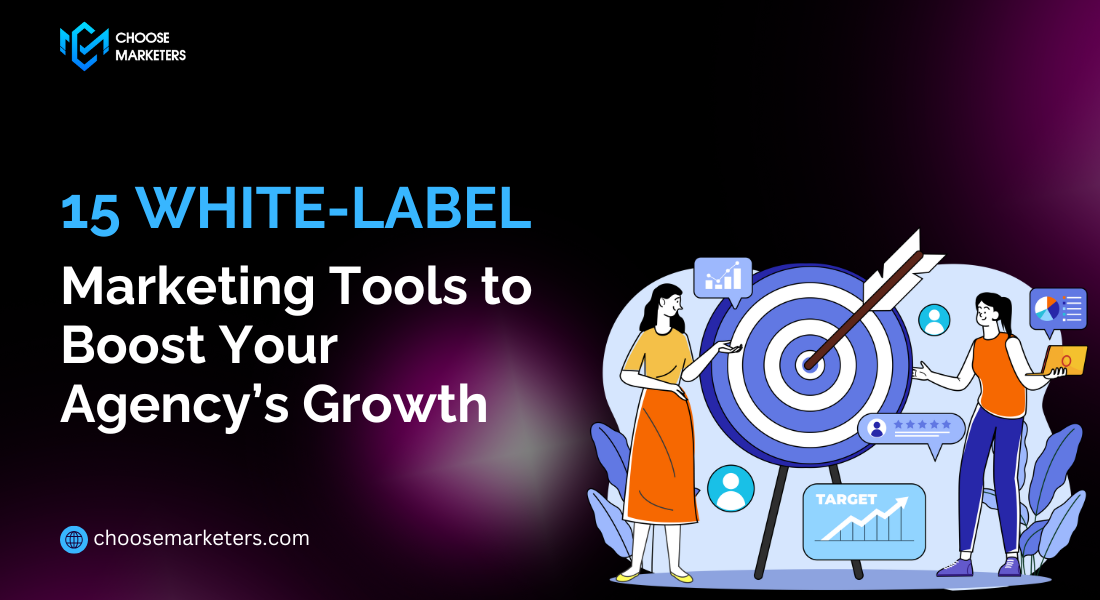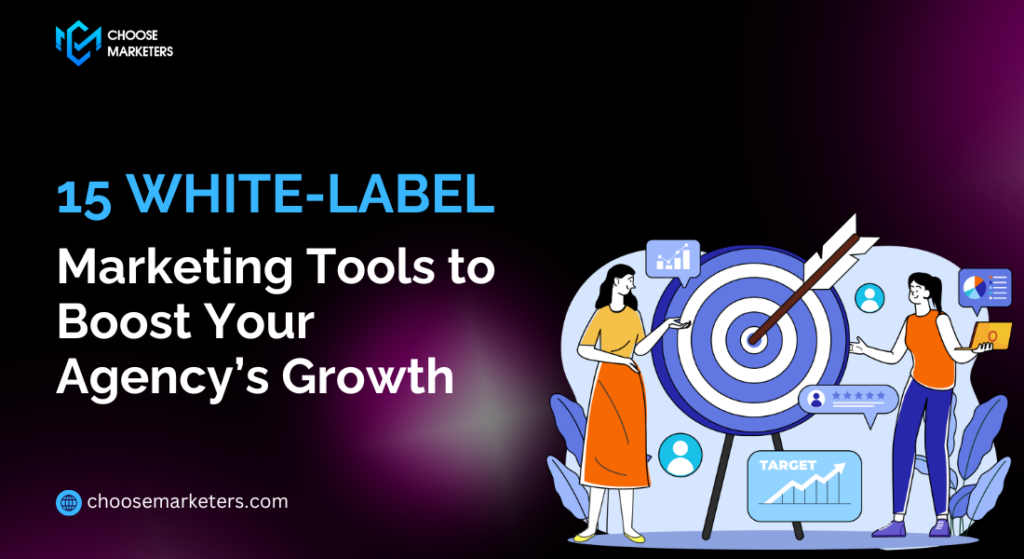

15 White-Label Marketing Tools to Boost Your Agency’s Growth

What Are White Label Marketing Tools?
White-label marketing tools are software platforms or services created by a provider but branded and used by another company as if they were their own. These tools allow businesses, particularly digital marketing agencies, to offer comprehensive marketing solutions like analytics, email marketing, social media management, or CRM systems without needing to build the tools themselves. Agencies rebrand and resell these services to clients, enabling them to deliver a robust suite of solutions that appear to be uniquely developed by the agency.
White-label tools provide digital agencies and small-to-medium businesses with the technology to extend their service offerings, enhance client loyalty, and maintain a professional brand image. They are often designed to be versatile, allowing users to customize the platform’s appearance, functionality, and sometimes even integration options. These tools allow companies to expand services and boost revenue without incurring high development costs, making them an attractive solution for businesses looking to scale efficiently.
Why Should Your Agency Use White-Label Marketing Tools?
Using white-label marketing tools offers agencies numerous advantages that can streamline operations, expand service offerings, and increase profitability.
Here’s why agencies are increasingly opting for white-label solutions:
1. Expanded Service Offerings Without Development Costs
White-label marketing tools allow agencies to offer a comprehensive range of services such as SEO, social media management, email marketing, and analytics without building these tools from scratch. This saves development time and resources, allowing agencies to deliver high-quality services under their brand.
2. Enhanced Brand Consistency and Client Trust
When agencies use white-label tools, they can fully customize and rebrand them, presenting a seamless, professional look that matches the agency’s identity. This customization builds trust, as clients receive services that appear to be exclusive offerings of the agency, reinforcing credibility and brand loyalty.
3. Cost-Effectiveness for Agencies of All Sizes
Building a full suite of marketing tools requires substantial investment in technology and development. White-label solutions offer agencies access to high-quality, feature-rich platforms for a fraction of that cost. This allows smaller agencies to compete effectively with larger firms and to scale their services as they grow.
4. Access to Ongoing Tool Enhancements
Many white-label tool providers update their software regularly, adding new features, improving functionality, and enhancing user experience. This means that agencies can deliver cutting-edge solutions without costly in-house upgrades, keeping them competitive and allowing them to adapt to evolving market demands.
5. Improved Focus on Core Competencies
With white-label tools handling technical aspects, agencies can focus on their core strengths like crafting strategies, managing client relationships, and executing campaigns. This streamlined focus increases productivity and allows agencies to deliver a higher quality of service in their area of expertise.
What Are the Types of White-Label Marketing Tools for Agencies?
White-label marketing tools come in various forms, offering a broad spectrum of solutions for digital agencies. These tools help streamline marketing efforts, provide analytics, and enhance client services without the need to build proprietary systems.
Below are some of the most commonly used types of white-label marketing tools for agencies:
1. White-Label SEO Tools
SEO is a critical part of any digital marketing strategy. White-label SEO tools enable agencies to offer comprehensive SEO services, such as keyword tracking, backlink analysis, site auditing, and rank monitoring. Tools like SE Ranking and Moz provide agencies with powerful analytics and reporting capabilities, allowing them to manage clients’ SEO needs effectively.
2. White-Label Social Media Management Tools
Social media marketing is another core service offered by agencies, and having the right tools to manage client profiles is essential. White-label social media management platforms like PromoRepublic, SocialPilot, and Hootsuite allow agencies to create branded reports, schedule posts, and manage multiple social media accounts. These tools also offer features for automating content distribution, tracking engagement, and analyzing social media performance.
3. White-Label Email Marketing Tools
Email marketing is still one of the most effective ways to nurture leads and maintain client relationships. White-label email marketing platforms such as ActiveCampaign, Mailchimp, and Sendinblue help agencies run campaigns with customizable email templates, advanced segmentation, and detailed analytics. These tools can be branded to align with the agency’s identity and used to automate workflows for clients.
4. White-Label Marketing Automation Software
Marketing automation is essential for improving efficiency and scaling marketing efforts. Platforms like HubSpot and Autopilot offer white-label marketing automation solutions that allow agencies to create automated workflows, manage leads, segment email lists, and track campaign performance all under their brand.
5. White-Label Analytics and Reporting Tools
Analytics and reporting are critical for tracking the success of marketing campaigns and making data-driven decisions. Tools like Google Data Studio and Whatagraph offer agencies the ability to create customized, white-label reports, providing clients with insights into their campaign performance. These tools are essential for showing ROI and providing transparent communication with clients.
6. White-Label CRM Tools
Customer Relationship Management (CRM) tools are crucial for managing interactions with clients and leads. White-label CRM platforms, such as Zoho CRM and HubSpot CRM, allow agencies to create client portals, manage contacts, and automate client communications all branded with the agency’s logo.
7. White-Label Web Development Tools
Agencies often require tools for creating websites, landing pages, and other digital assets for their clients. Platforms like Landingi and Weblium allow for creating landing pages and websites that can be fully customized and rebranded, offering a seamless experience for clients.
8. White-Label Content Creation Tools
Content is at the heart of digital marketing, and agencies need tools to generate high-quality content quickly. White-label content creation tools, such as Lumen5 for video content and Xtensio for presentations, provide agencies with the ability to create branded content for clients without the need for third-party branding.
9. White-Label Client Portal Solutions
To ensure smooth client communication and project management, white-label client portal solutions like Service Provider Pro enable agencies to offer clients a branded space for managing projects, accessing reports, and communicating directly with the agency. These tools enhance client experience and satisfaction, making it easier for clients to engage with the agency.
What Are the Top Benefits of Using White Label Marketing Software?
White-label marketing software offers several benefits for agencies, helping them grow and streamline operations:
- Cost-Effective & Time-Saving: These tools are ready to use, eliminating the need for custom development and reducing operational costs.
- Brand Customization: Agencies can personalize the software with their branding, providing a seamless client experience.
- Access to Advanced Features: White-label platforms offer powerful tools without requiring technical expertise, allowing agencies to offer high-end services.
- Scalability: These tools are designed to grow with your business, handling increased client demands effortlessly.
- Focus on Core Services: Agencies can concentrate on strategy and client relationships, while the software handles the technical aspects.
- Improved Client Satisfaction: Customizable reports and automated workflows enhance client experiences, leading to better relationships.
- Competitive Advantage: Offering a full suite of services with white-label tools can help agencies stand out in the market.
- Analytics & Reporting: Built-in analytics allow agencies to measure campaign performance and refine strategies for better results.
What Are the Top White Label Marketing Platforms for Digital Agencies?
Choosing the best white-label marketing platforms can provide digital agencies with the tools they need to streamline their services while branding them as their own.
Below are some top platforms that help agencies deliver a wide range of services to their clients, from analytics and reporting to email automation and lead generation:
1. Whatagraph: Analytics and Reporting
Whatagraph is a powerful analytics and reporting tool designed for agencies. It integrates data from multiple sources, providing easy-to-read, customized reports that agencies can brand as their own. This is perfect for agencies that need to show detailed campaign performance to their clients.
2. DashThis: Comprehensive Reporting
DashThis allows agencies to create white-label marketing dashboards for their clients. Its intuitive interface allows users to combine various marketing data and present it in a visually appealing, branded format, making it a perfect solution for marketing agencies focusing on data-driven reporting.
3. ActiveCampaign: Email Automation Solutions
Known for its advanced email automation capabilities, ActiveCampaign allows agencies to automate email marketing campaigns, segment contacts, and send personalized messages. Agencies can brand the platform as their own while benefiting from its powerful features.
4. SE Ranking: SEO Management
SE Ranking provides a comprehensive suite of SEO tools that help agencies manage client SEO efforts. From keyword tracking to on-page SEO analysis and backlink monitoring, it offers everything an agency needs to boost clients’ search rankings.
5. Semrush: SEO and Digital Marketing
Semrush is a versatile SEO platform used by agencies to manage SEO campaigns, track performance, and analyze competitors. It offers comprehensive marketing insights across SEO, content, advertising, and social media marketing, making it a popular choice for agencies that want to offer comprehensive digital marketing services.
6. SocialPilot: Social Media Management
SocialPilot is a white-label social media management platform that allows agencies to manage, schedule, and analyze social media posts for their clients. It offers a range of tools for both organic social media marketing and paid ad campaigns.
7. Vendasta: E-commerce and Sales Enablement
Vendasta is an all-in-one platform designed for agencies to provide a wide range of digital marketing services, including CRM, reputation management, and e-commerce solutions. Agencies can rebrand the platform and offer it to clients as their digital marketing suite.
8. PromoRepublic: Social Media Management
PromoRepublic is another powerful social media management tool that agencies can white-label. It allows users to create, schedule, and analyze content across multiple social media platforms while maintaining a branded experience.
9. Metrics Watch: Marketing Analytics
Metrics Watch focuses on providing marketing analytics and reporting tools. It helps agencies track KPIs and generate insightful reports for clients, all while offering a customizable, branded interface.
10. HubSpot: CRM and Marketing Automation
HubSpot’s marketing automation platform is widely recognized for its robust CRM capabilities, lead-generation tools, and automated email marketing. Agencies can rebrand HubSpot’s tools to provide personalized marketing solutions to clients.
11. FlyWheel: Client Billing and Hosting
FlyWheel is a white-label hosting and billing platform tailored to agencies that offer website development and hosting services. It enables agencies to manage their clients’ websites while providing an intuitive, rebranded interface.
12. OptinMonster: Lead Generation and Conversion
OptinMonster is a lead generation tool designed to help agencies grow their client base. It offers powerful opt-in forms and conversion tools, allowing agencies to optimize lead generation for their clients.
13. Lumen5: Video Marketing Creation
Lumen5 allows agencies to create engaging video content for social media, blogs, and ads. This platform is ideal for agencies offering video marketing services as it simplifies the video creation process, enabling teams to produce professional videos quickly and efficiently.
14. Landingi: Landing Page Builder
Landingi provides a powerful landing page builder that agencies can white-label. It allows them to create high-converting landing pages for clients, offering customizable templates and an easy-to-use drag-and-drop interface.
15. Xtensio: Content Collaboration and Design
Xtensio is a platform that agencies use to create and collaborate on content marketing materials such as proposals, reports, and presentations. Its collaborative tools make it easy for teams to create and refine documents, all within a white-label interface.
What Features Should You Look for in White Label Marketing Software?
When selecting white-label marketing software for your agency, several features are critical to ensuring that the platform aligns with your business needs. These features not only enhance functionality but also help you provide customized, high-quality services to your clients.
Here’s a breakdown of the most important features to consider:
1. Customization and Branding
Customization is one of the top features agencies seek in white-label marketing software. This allows you to rebrand the platform with your agency’s logo, colors, and design, giving your clients the impression that the tool is developed in-house. Look for software that offers:
- Logo and color customization for full rebranding.
- Custom domain options, so the platform appears entirely branded to your agency’s identity.
- Personalized email templates and reports, allowing you to send out branded communication to clients.
These customization features ensure that the software feels integrated into your agency’s operations and offers clients a seamless experience that matches your branding.
2. Integration Capabilities
A good white-label marketing platform should easily integrate with the other tools and platforms you use in your agency’s workflow. Integration helps streamline processes and enables the software to communicate effectively with your existing systems. Integration features to look for include:
- CRM integration, so client data flows seamlessly between your marketing efforts and customer relationship management tools.
- Social media platform integrations, allow for easy posting, scheduling, and monitoring across different social media accounts.
- E-commerce and third-party tools, help link sales data, marketing campaigns, and customer behavior for more personalized campaigns.
The more integrations a platform offers, the more likely it is to fit into your existing ecosystem without causing disruptions or extra work for your team.
3. Pricing and Customer Support
The right white-label marketing software should offer a balance between competitive pricing and reliable customer support. Consider these factors when evaluating pricing and support:
- Flexible pricing tiers based on your agency’s needs. Some platforms charge per user, while others may charge based on the number of clients or campaigns. Find a structure that fits your business model.
- Clear pricing transparency, with no hidden fees or surprise charges for essential features.
- Responsive customer support through multiple channels (e.g., chat, email, phone support) is crucial to resolving any issues quickly.
- Access to resources such as tutorials, FAQs, or customer success teams that can help onboard new users.
Great customer support helps your agency avoid downtime and keeps your workflow running smoothly, which is essential for providing top-notch service to your clients.
How to Select the Right White Label Marketing Tools for Your Agency?
Choosing the right white-label marketing tools for your agency can be a game-changer in terms of scalability, efficiency, and client satisfaction. With so many platforms available, it’s crucial to carefully evaluate each option to find the one that best meets your agency’s specific needs.
Here are Considerations to keep in mind when selecting a white-label marketing tool:
1. Assess Your Agency’s Needs and Objectives
Start by identifying what your agency’s core needs are. Do you primarily offer SEO services, social media management, email marketing, or content marketing? Some tools specialize in certain areas, so selecting a platform that aligns with your offerings will ensure the tool’s usefulness.
For example, if your focus is SEO, tools like SE Ranking or Semrush might be ideal, as they offer comprehensive features for search engine optimization. On the other hand, if social media management is your priority, platforms like SocialPilot and PromoRepublic would be more suitable. For agencies needing comprehensive support across multiple services, Choose Marketers offers complete white-label services including SEO, social media marketing, content marketing, and more, making it an all-in-one option for scaling effortlessly.
2. Evaluate Customization and White-Labeling Options
Customization is one of the main reasons agencies turn to white-label marketing tools. Look for platforms that allow extensive branding customization, such as adding your logo, color scheme, and even domain names. Customizable reporting and email templates will help ensure that your clients feel they are receiving services directly from your agency rather than a third-party provider.
Make sure that the level of customization available matches the expectations you have for your agency’s branding. A lack of customization can result in an impersonal user experience, diminishing the overall value of the tool.
3. Look for Integration with Existing Tools
Integration capabilities are essential when selecting white-label marketing software. The tool should integrate easily with the other systems and tools you use, such as customer relationship management (CRM) platforms, email marketing systems, and analytics tools. This creates a seamless workflow and ensures your agency’s operations are efficient.
For example, a platform like HubSpot offers comprehensive CRM and marketing automation features, while Vendasta provides a wide range of integrations for managing various digital marketing services. Ensuring smooth integration with your current tech stack can save time and reduce the risk of technical issues down the road.
4. Consider Scalability
As your agency grows, your tools should be able to scale with you. Look for white-label marketing platforms that offer flexible pricing tiers, so you can easily add more clients, users, or features as needed. Scalability also includes the ability to manage a growing number of campaigns, clients, and data without a decrease in performance.
A tool like ActiveCampaign offers scalable email marketing automation, allowing agencies to manage multiple clients with ease as they expand. Choose Marketers also provides scalable solutions across various services, making it easy for agencies to expand their offerings without missing a beat.
5. Check for Support and Customer Service
Reliable customer support is a must-have feature when selecting a white-label marketing platform. Even with the best tools, you’ll encounter occasional issues that need fast resolution. A strong support team can prevent downtime, help with technical issues, and provide ongoing training to your team.
Look for tools that offer 24/7 support, a comprehensive knowledge base, and clear communication channels. Some platforms even provide onboarding support, which can help your agency hit the ground running.
6. Pricing and Value
Finally, while pricing should not be the only determining factor, it is essential to find a white-label marketing tool that provides value for money. Carefully evaluate the tool’s features and compare them to the pricing structure. Consider whether the platform offers a free trial or a money-back guarantee, which allows you to test the tool before fully committing.
For example, platforms like SE Ranking and Whatagraph offer competitive pricing for smaller agencies, while more robust solutions like HubSpot may be better suited for larger agencies, with the flexibility to scale. Choose Marketers also offers affordable pricing, making it a great option for agencies seeking expert support to meet client needs.
How to Implement White-Label Marketing Tools Effectively?
Implementing white-label marketing tools effectively is crucial for digital agencies looking to streamline operations and deliver high-quality services to their clients.
Here’s a step-by-step guide:
1. Assess Your Agency’s Needs and Choose the Right Tools
Start by identifying the areas where your agency needs support. For example, if you want to expand your White-Label SEO Marketing services, selecting the right SEO tools, such as SE Ranking, can improve your overall effectiveness.
2. Customize the Tool for Your Brand
Customization helps the tool reflect your agency’s branding. Adjust logos, colors, and templates to give clients a seamless, branded experience. For instance, ActiveCampaign offers customization options that allow you to apply your agency’s branding and create a unique marketing experience for clients.
3. Integrate the Tool with Your Existing Systems
Ensure that your chosen tools integrate seamlessly with your current systems. This will reduce manual work and help automate marketing processes. Platforms like HubSpot integrate well with CRM tools, enhancing client communication and campaign tracking.
4. Train Your Team on the Tool’s Use
Training is essential to maximize the tool’s capabilities. Many platforms, like SE Ranking, offer tutorials and support to ensure your team can leverage the full potential of the software, saving time and boosting productivity.
5. Monitor and Track the Tool’s Performance
After implementing the tool, track its performance to ensure it meets your agency’s needs. Tools like Whatagraph are ideal for tracking performance metrics and reporting campaign results, giving you insight into whether the tool is delivering as expected.
6. Make Adjustments as Needed
Based on the performance data, continuously optimize the way you use the tool. Adjust settings, explore new features, and refine processes to ensure your agency remains at the cutting edge. For example, Vendasta offers new features over time, helping agencies scale their operations effectively.
7. Communicate Clearly with Clients
Transparency with your clients about the tools you use builds trust. Make sure they understand how white-label tools enhance the service you provide. Offering White-Label Content Marketing allows your agency to provide robust, consistent results while keeping clients informed of every development.
Connect with Choose Marketers on LinkedIn and discover how our customized SEO solutions can boost your agency’s success and client satisfaction. Let’s Boost your digital marketing game together.
Frequently Asked Questions (FAQs)
1. What Are White Label Marketing Tools?
White-label marketing tools are software solutions that digital agencies can brand as their own and offer to clients. These tools allow agencies to deliver services like SEO, social media management, content creation, and more, without having to develop the tools from scratch.
2. Why Should Your Agency Use White Label Marketing Tools?
White-label tools save time, reduce operational costs, and allow agencies to offer a wider range of services without the need for in-house development. They help agencies scale faster while maintaining a branded experience for clients.
3. What Are the Benefits of Using White Label Marketing Tools?
Using white-label marketing tools can help improve service delivery, offer scalable solutions, and provide your clients with high-quality services quickly and cost-effectively. These tools also allow agencies to focus more on strategy while automating other tasks.
4. How Do White Label Marketing Tools Improve Agency Efficiency?
White-label tools improve efficiency by automating tasks, offering customizable templates, and integrating seamlessly with existing platforms. This means agencies can handle multiple client projects simultaneously without the need for additional resources.
5. Can I Offer Multiple Services with White Label Marketing Tools?
Yes, you can offer a variety of services, including White Label SEO Marketing, White Label Social Media Marketing, and White Label Content Marketing. With the right tools, agencies can easily diversify their service offerings without having to manage each service individually.

